Find Help
More Items From Ergsy search
-
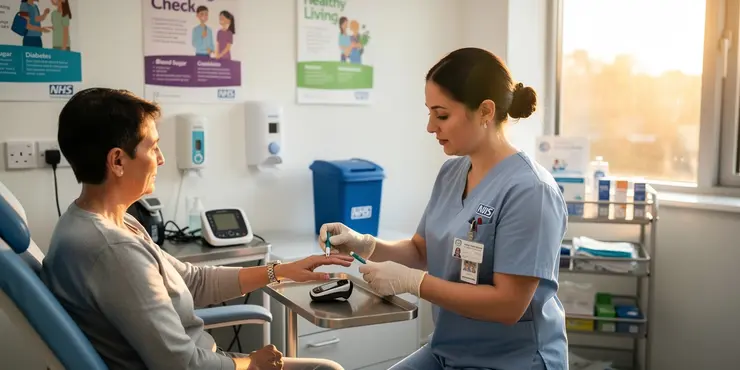
Diabetes: How to check your blood glucose level | NHS
Relevance: 100%
-
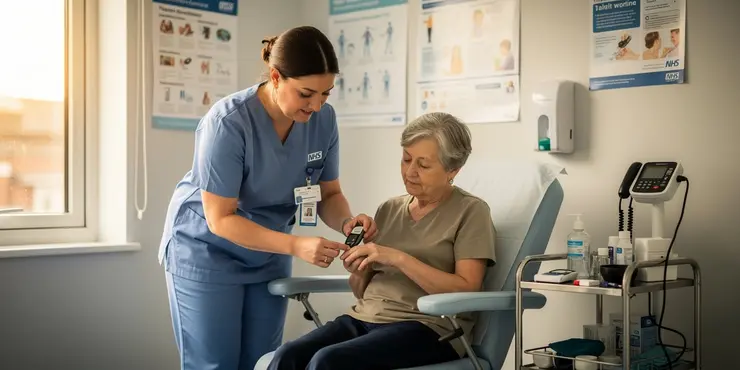
How often should I check my blood glucose levels?
Relevance: 94%
-

Can Baxdrostat affect blood sugar levels?
Relevance: 67%
-
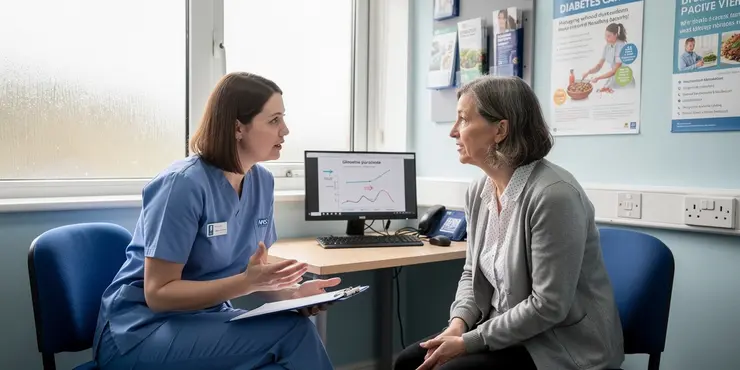
What impact does GLP-1 have on glucose metabolism?
Relevance: 62%
-

How is Type 2 Diabetes diagnosed?
Relevance: 59%
-
Does drinking orange juice affect blood sugar levels?
Relevance: 58%
-

How does Ozempic affect blood sugar levels?
Relevance: 56%
-
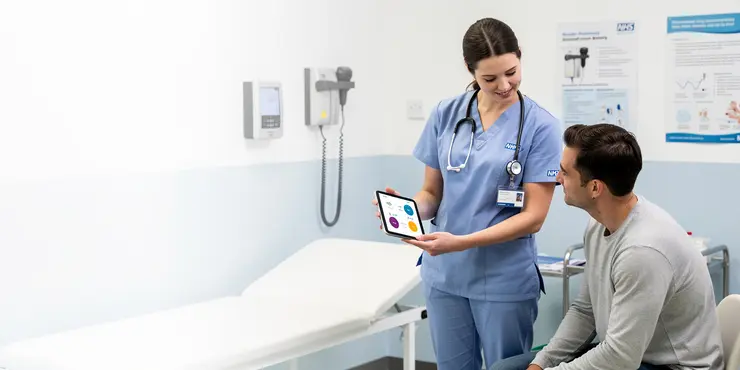
Improving outcomes for people with diabetes
Relevance: 56%
-
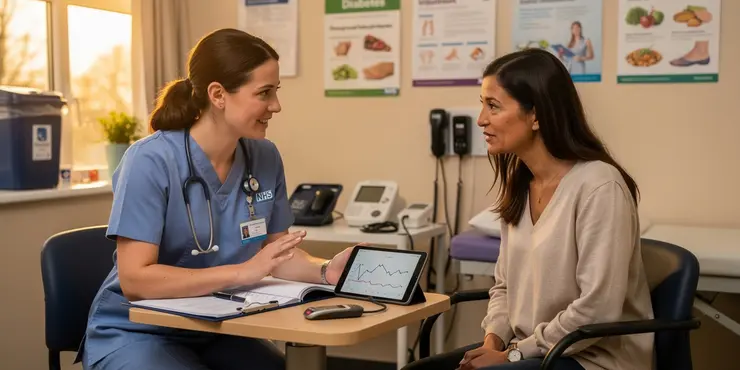
What Is Type 2 Diabetes? | 2 Minute Guide | Diabetes UK
Relevance: 55%
-

How to manage type 2 diabetes
Relevance: 55%
-
Can I have sugar if I am diabetic?
Relevance: 55%
-
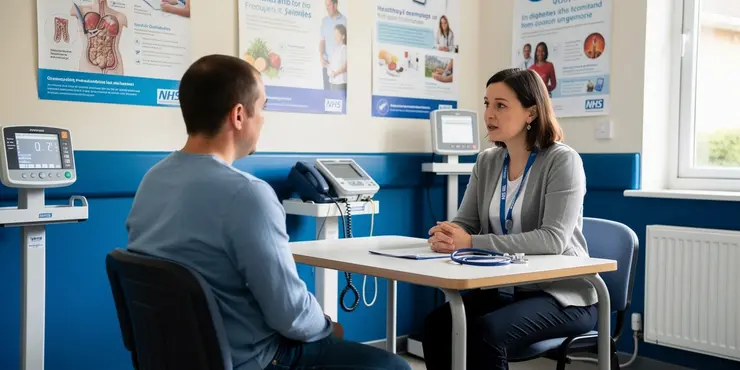
Is Ozempic suitable for type 1 diabetes?
Relevance: 54%
-

How effective is Mounjaro in controlling blood sugar levels?
Relevance: 53%
-
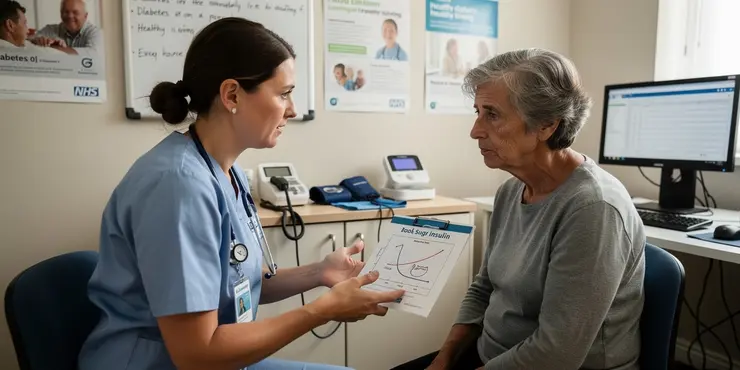
What is the role of insulin in Type 2 Diabetes?
Relevance: 53%
-

Type 1 Diabetes supporting adults to manage Type 1 diabetes
Relevance: 52%
-
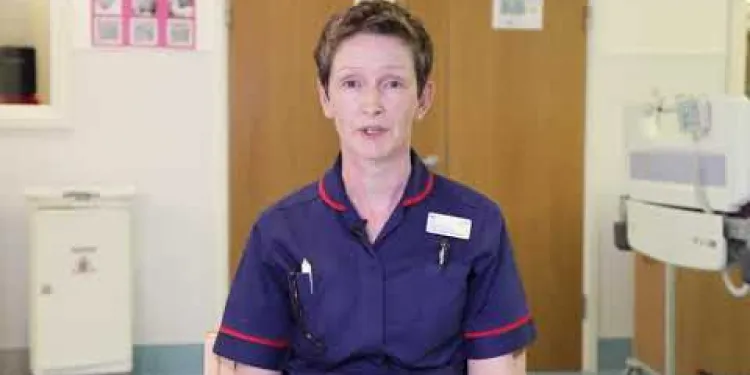
Gestational Diabetes during pregnancy
Relevance: 51%
-
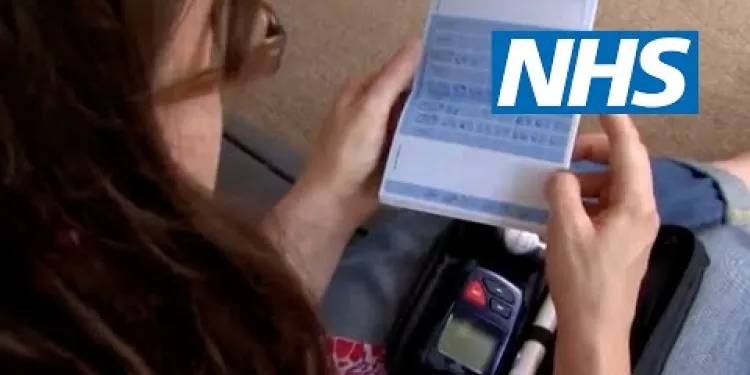
Gestational diabetes | NHS
Relevance: 51%
-

How is Type 2 Diabetes treated?
Relevance: 51%
-

Can stress affect my Type 2 Diabetes?
Relevance: 50%
-
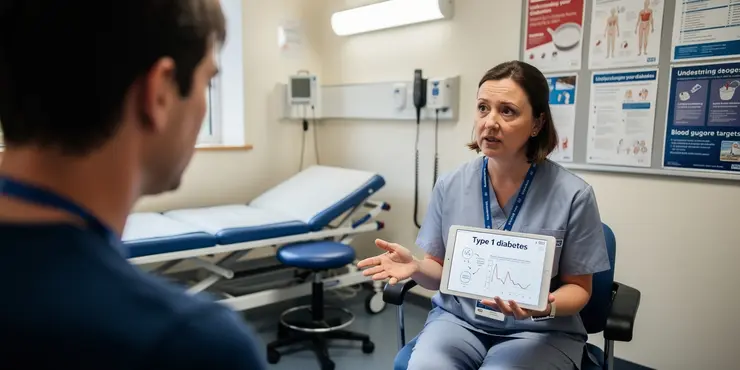
What is type 1 diabetes?
Relevance: 50%
-
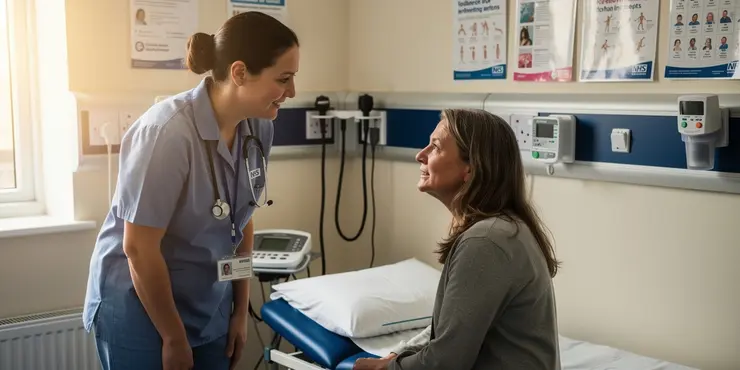
What are the symptoms of Type 2 Diabetes?
Relevance: 49%
-

What causes Type 2 Diabetes?
Relevance: 49%
-
Is it safe to drink orange juice if I have diabetes?
Relevance: 49%
-
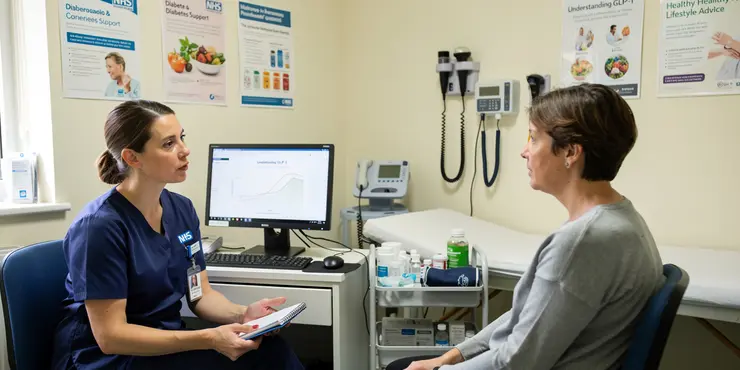
Can GLP-1 levels be measured?
Relevance: 48%
-

Type 2 diabetes - common signs and symptoms UHL NHS Trust
Relevance: 48%
-
What are the benefits of early detection of type 1 diabetes?
Relevance: 46%
-
What is the difference between type 1 and type 2 diabetes?
Relevance: 46%
-
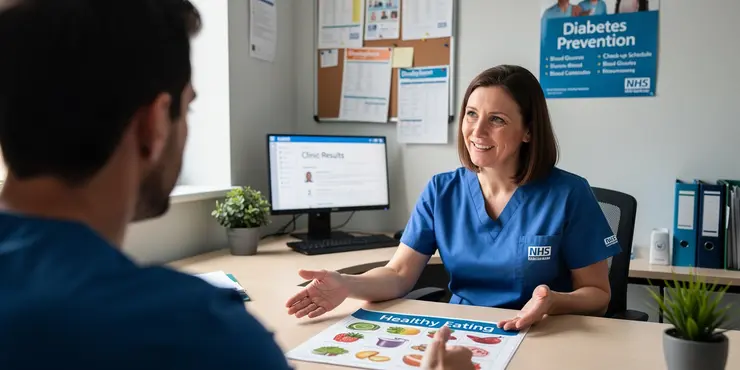
Can Type 2 Diabetes be prevented?
Relevance: 45%
-

What role does GLP-1 play in diabetes management?
Relevance: 45%
-
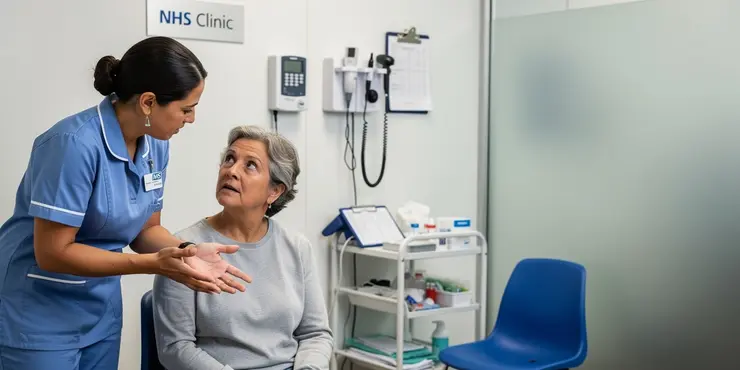
Can Ozempic cause low blood sugar (hypoglycemia)?
Relevance: 44%
-
Are there any symptoms of type 1 diabetes I should watch for in my child?
Relevance: 44%
-

Sarah and Glinys Managing Diabetes into remission Jan2019
Relevance: 43%
-
Is there a genetic predisposition to type 1 diabetes?
Relevance: 43%
-
What is type 1 diabetes?
Relevance: 42%
-
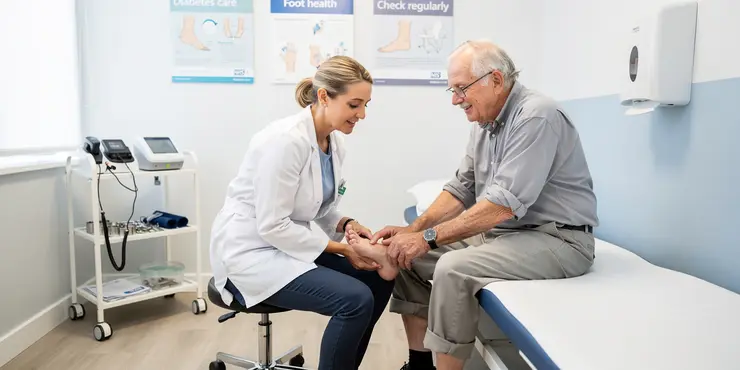
Diabetes Care - Preventing Amputations
Relevance: 42%
-

Can Mounjaro be used in type 1 diabetes?
Relevance: 42%
-
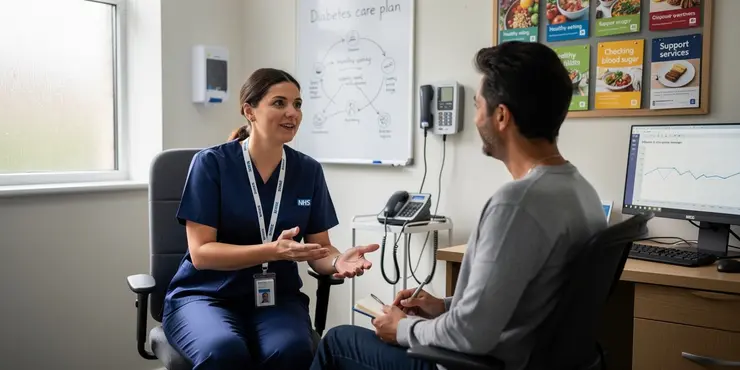
What complications are associated with Type 2 Diabetes?
Relevance: 41%
-

Can Type 2 Diabetes go away?
Relevance: 41%
-

Can exercise help prevent gestational diabetes?
Relevance: 40%
-

What is the connection between GLP-1 and insulin?
Relevance: 40%
Diabetes: How to Check Your Blood Glucose Level | NHS
Monitoring blood glucose levels is an essential part of managing diabetes. Maintaining optimal blood glucose levels can prevent complications and improve the quality of life. The NHS recommends regular checks to keep your diabetes in control. This guide will inform you on how to perform these checks effectively.
Why Check Blood Glucose Levels?
Regular monitoring helps you understand how food, exercise, and medication affect your glucose levels. By keeping track, you'll be able to make informed decisions about diet and exercise. This can greatly reduce the risk of complications such as cardiovascular disease, neuropathy, and retinopathy.
When to Check Blood Glucose Levels
The timing and frequency of glucose checks can vary based on your individual treatment plan. Generally, those with Type 1 diabetes may need to check their levels multiple times a day, while those with Type 2 diabetes might need less frequent checks. Common times to check include:
- Before meals
- After meals
- Before and after exercise
- Before bedtime
- When you feel unwell
Types of Blood Glucose Meters
There are various types of blood glucose meters available. The most common include:
- Standard blood glucose meters
- Continuous glucose monitors (CGMs)
- Flash glucose monitoring systems
Each type has its own advantages and specific instructions for use. It's important to choose a device that fits your lifestyle and is easy for you to use.
Steps to Check Your Blood Glucose Levels
- Wash your hands thoroughly to ensure accurate readings.
- Prepare your kit: Gather your meter, test strips, and a lancing device.
- Insert a test strip into the meter.
- Use the lancing device to prick the side of your fingertip to get a drop of blood.
- Touch the edge of the test strip to the drop of blood and wait for the meter to process the reading.
- Record your reading, including the time and date.
Interpreting Results
The NHS recommends the following target blood glucose levels for most adults with diabetes:
- Before meals: 4 to 7 mmol/L
- After meals: less than 9 mmol/L
Your healthcare provider may provide a different target range tailored to your needs. If your readings are consistently outside your target range, consult your healthcare provider for advice on adjusting your management plan.
For more information and support, you can visit the NHS Diabetes page.
Diabetes: How to Check Your Blood Sugar Level
Checking your blood sugar is very important if you have diabetes. Keeping your blood sugar levels right can help you feel better and prevent problems. The NHS says you should check your blood sugar often. This guide will show you how to do it easily.
Why Check Blood Sugar Levels?
When you keep an eye on your blood sugar, you can see how food, exercise, and medicine change your levels. This helps you make good choices about what to eat and how to exercise. It can help you avoid problems like heart disease, nerve pain, and eye issues.
When to Check Blood Sugar Levels
How often you check depends on your treatment plan. People with Type 1 diabetes usually check several times a day. People with Type 2 diabetes might check less often. Common times to check are:
- Before you eat
- After you eat
- Before and after exercise
- Before you go to sleep
- When you feel sick
Types of Blood Sugar Meters
There are different kinds of blood sugar meters. The most common are:
- Standard blood sugar meters
- Continuous glucose monitors (CGMs)
- Flash glucose monitors
Each one has its own benefits. Pick one that works for you and is easy to use.
Steps to Check Your Blood Sugar Levels
- Wash your hands well to get a good reading.
- Get your kit ready: you need your meter, test strips, and a lancing device.
- Put a test strip into the meter.
- Use the lancing device to prick the side of your finger for a drop of blood.
- Touch the test strip to the blood drop and wait for the result.
- Write down your reading with the time and date.
Understanding the Results
The NHS suggests these target blood sugar levels for most adults with diabetes:
- Before meals: 4 to 7 mmol/L
- After meals: less than 9 mmol/L
Your doctor might give you different targets. If your results are often not in your target range, talk to your doctor for help. For more information, visit the NHS Diabetes page.
Frequently Asked Questions
What is blood glucose monitoring?
Blood glucose monitoring involves regularly testing the level of glucose in your blood. It helps you manage diabetes by providing information on how various factors affect your blood glucose levels.
Why is it important to check blood glucose levels?
Checking blood glucose levels helps you manage your diabetes, avoid complications, and make informed decisions about your diet, exercise, and medication.
What are the normal blood glucose levels?
For most people with diabetes, the target blood glucose levels are: 4 to 7 mmol/L before meals and under 9 mmol/L 2 hours after meals.
How often should I check my blood glucose levels?
The frequency of testing varies depending on your treatment plan and the type of diabetes you have. Typically, you may need to check your levels several times a day.
What equipment do I need to check my blood glucose levels?
You need a blood glucose meter, test strips, a lancet device, and lancets to check your blood glucose levels.
How do I use a blood glucose meter?
Wash your hands, insert a test strip into the meter, use the lancet device to prick your finger, squeeze out a drop of blood onto the test strip, and wait for the meter to display your blood glucose level.
What should I do if my blood glucose levels are too high?
If your blood glucose levels are too high, you may need to adjust your medication, diet, or exercise routine. Contact your healthcare provider for guidance.
What should I do if my blood glucose levels are too low?
If you experience low blood glucose (hypoglycaemia), consume fast-acting carbohydrates like glucose tablets or juice. Recheck your levels after 15 minutes and seek medical advice if necessary.
Can stress affect my blood glucose levels?
Yes, stress can affect your blood glucose levels by releasing hormones that can increase blood glucose. Managing stress through relaxation techniques and physical activity can help.
How does food impact blood glucose levels?
Carbohydrates, protein, and fat can all impact blood glucose levels. Monitoring your diet and understanding how different foods affect your levels is crucial.
Can I use alternative sites for blood sampling?
Yes, some glucose meters allow for alternative site testing (e.g., forearm, palm). However, fingertip testing usually provides more accurate and timely results.
Is it safe to reuse lancets?
It is generally not recommended to reuse lancets as it can lead to infections and cause the needle to become blunt, making testing more painful.
What can cause inaccurate blood glucose readings?
Factors such as expired test strips, improper storage of supplies, unclean hands, and insufficient blood sample size can cause inaccurate readings.
Should I keep a record of my blood glucose levels?
Yes, keeping a record of your blood glucose levels can help you and your healthcare provider manage your diabetes more effectively.
Can I use a continuous glucose monitor (CGM) instead of finger-pricking?
A CGM can provide real-time glucose readings without finger-pricks. However, you may still need to do occasional finger-prick tests to ensure accuracy and calibrate the CGM.
What is checking blood sugar?
Checking blood sugar means finding out how much sugar is in your blood.
People do this to make sure their sugar levels are okay.
You can use a small machine to check your blood sugar at home.
If you need help, ask an adult to show you how to use it.
Checking your blood sugar means you test how much sugar is in your blood often. This helps you take care of diabetes by showing you how different things change your blood sugar levels.
Why Should You Check Blood Sugar Levels?
Checking blood sugar is important. It helps you know how much sugar is in your blood. This is important for people with diabetes.
Knowing your blood sugar level can help you:
- Feel better each day.
- Stay healthy in the long term.
- Know when you need to eat or take medicine.
If you find it hard to check, you can:
- Ask a helper, like a family member or friend.
- Use a special tool that reads your blood sugar easily.
- Talk to your doctor or nurse for more tips.
Checking your blood sugar is important. It helps you take care of your diabetes. It also helps you stay healthy and make good choices about what you eat, how you exercise, and the medicine you take.
What is a normal blood sugar level?
Blood sugar is the amount of sugar in your blood.
A normal blood sugar level is how much sugar is in your blood when you are healthy.
If you want to know your blood sugar level, you can use a little tool called a blood sugar meter. It helps you check how much sugar is in your blood.
If you have a question or need help, ask a doctor or nurse. They can give you good advice.
If you have diabetes, try to keep your blood sugar between 4 and 7 before you eat. After eating, it should be less than 9 after 2 hours.
How often should I check my blood sugar?
It is good to check your blood sugar every day. Try to check it at the same time each day. Maybe in the morning or before a meal.
If you want help, you can use an alarm to remind you. You can also ask someone for support if you need it.
How often you check your sugar levels depends on how you are treated and what type of diabetes you have. You will usually need to check your levels a few times each day.
What do I need to check my blood sugar?
To check your blood sugar, you will need:
- A blood sugar meter. This is a small machine that shows your blood sugar number.
- Test strips. These are small strips that you put in the meter.
- A lancet. This is a tiny needle to poke your finger to get a drop of blood.
Ask an adult or a nurse to help you. You can also watch videos online that show how to use these tools.
You need a special tool to check your blood sugar. This tool is called a blood glucose meter. You also need test strips, a small needle tool called a lancet device, and tiny needles called lancets.
Here are some helpful ideas:
- Use pictures: Look for images of the items. Seeing pictures can help you understand each part.
- Ask for help: A grown-up can show you how to use these tools.
How do I use a blood sugar meter?
A blood sugar meter checks sugar in your blood. This is important for people with diabetes.
Here is how to use it:
- Wash your hands. Clean hands help you get a good reading.
- Put a test strip in the meter. The test strip is what the blood goes on.
- Use a lancet to prick your finger. This will make a little drop of blood.
- Touch the drop of blood to the test strip. The meter will read the blood.
- Wait for the result. The meter will show you a number. This is your blood sugar level.
Helpful tips:
- Ask an adult to help you if you need it.
- Use a notebook or an app to track your blood sugar levels.
- Ask your doctor how often you need to check your blood sugar.
Let's clean our hands first. Put a test strip into the meter. Use a small needle to gently poke your finger. Press on your finger to get a drop of blood. Put the drop of blood on the test strip. Now, wait for the meter to show your blood sugar level.
What can I do if my blood sugar is too high?
If your blood sugar is higher than it should be, do not worry. Here's what you can do:
- Drink lots of water. Water helps to flush out the extra sugar.
- Try to move around. A short walk or some gentle exercises can help lower your sugar levels.
- Check your medication. Did you forget to take your medicine? If you did, take it as your doctor told you.
- Eat healthy food. Avoid sugary drinks and sweets. They can make your sugar go higher.
- Ask for help. If you are not sure what to do, call your doctor or nurse.
Remember, it's okay to ask for help when you need it!
If your blood sugar is too high, you might need to change your medicine, the food you eat, or how much you exercise. Talk to your doctor or nurse to find out what to do.
What should I do if my blood sugar is too low?
Here is what you can do if your blood sugar is too low:
- Eat or drink something sweet, like fruit juice or candy.
- Check your blood sugar with your meter.
- Rest and take it easy for a little while.
- Ask someone for help if you need to.
If you have a plan from your doctor or nurse, follow that. You can use pictures or reminders to help you remember what to do.
If your blood sugar gets too low, eat or drink something sweet. You can have special sugar tablets or a small glass of juice. Check your blood sugar again after 15 minutes. If you still feel unwell, talk to a doctor.
Can stress change my blood sugar levels?
Yes, feeling stressed can change your blood sugar levels. Stress makes your body release special chemicals that can make your blood sugar go up. To help, you can try to feel calm by doing things like deep breathing, stretching, or going for a walk.
How does food change blood sugar levels?
When we eat, our body uses food for energy. Some foods can make blood sugar go up fast. Others can make it go up slowly. Understanding this helps us stay healthy.
Helpful Tips:
- Eat fruits and vegetables.
- Choose whole grains like brown rice.
- Ask a grown-up if you have questions.
- Use pictures to help understand better.
Carbohydrates, protein, and fat can change your blood sugar levels. It is important to check what you eat and know how different foods change your blood sugar.
Can I use other places on my body to take a blood sample?
Yes, some blood sugar meters let you test on other spots like your arm or palm. But testing on your fingertip usually gives better and faster results.
Tip: If you find it hard to test on your fingertip, ask someone to help you. You can also use special tools to make it easier.
Can you use the same lancet more than once?
Lancets are tiny needles. People use them to check their blood sugar. It is better to use a new lancet every time. This helps keep your skin clean and safe.
It's not a good idea to use the same lancet more than once. It can make you sick. The needle can also get dull and hurt more when you use it again.
Why might blood sugar readings be wrong?
Sometimes, blood sugar tests can show the wrong numbers. This can happen if:
- You use test strips that are too old.
- You don't store your supplies in the right way.
- Your hands are not clean.
- You don't use enough blood for the test.
To help you get the right numbers, you can:
- Check the date on your test strips to make sure they are not too old.
- Store your supplies in a safe place.
- Wash your hands before testing.
- Make sure you use enough blood for the test.
Should I write down my blood sugar levels?
It can be a good idea to write down your blood sugar levels. This can help you and your doctor know how you are doing.
Ask a doctor or nurse where to write these numbers. You can use a notebook or a special app on your phone. If you need help, ask someone you trust to help you write or use the app.
Yes, writing down your blood sugar levels can help you and your doctor take care of your diabetes better.
Can I use a CGM instead of pricking my finger?
A CGM checks your blood sugar all the time. You don't need to prick your finger as much. Some people find CGMs easier to use. Talk to your doctor about what is best for you.
Helpful tools:
- Ask someone to help you read the instructions.
- Use pictures or videos to learn how to use a CGM.
A CGM is a device that can check your sugar levels without needing to prick your finger. But sometimes, you might still need to do a finger prick test to make sure the CGM is working correctly and giving the right readings.
Useful Links
This website offers general information and is not a substitute for professional advice.
Always seek guidance from qualified professionals.
If you have any medical concerns or need urgent help, contact a healthcare professional or emergency services immediately.
Some of this content was generated with AI assistance. We’ve done our best to keep it accurate, helpful, and human-friendly.
- Ergsy carfully checks the information in the videos we provide here.
- Videos shown by Youtube after a video has completed, have NOT been reviewed by ERGSY.
- To view, click the arrow in centre of video.
- Most of the videos you find here will have subtitles and/or closed captions available.
- You may need to turn these on, and choose your preferred language.
- Go to the video you'd like to watch.
- If closed captions (CC) are available, settings will be visible on the bottom right of the video player.
- To turn on Captions, click settings .
- To turn off Captions, click settings again.
More Items From Ergsy search
-

Diabetes: How to check your blood glucose level | NHS
Relevance: 100%
-

How often should I check my blood glucose levels?
Relevance: 94%
-

Can Baxdrostat affect blood sugar levels?
Relevance: 67%
-

What impact does GLP-1 have on glucose metabolism?
Relevance: 62%
-

How is Type 2 Diabetes diagnosed?
Relevance: 59%
-
Does drinking orange juice affect blood sugar levels?
Relevance: 58%
-

How does Ozempic affect blood sugar levels?
Relevance: 56%
-

Improving outcomes for people with diabetes
Relevance: 56%
-

What Is Type 2 Diabetes? | 2 Minute Guide | Diabetes UK
Relevance: 55%
-

How to manage type 2 diabetes
Relevance: 55%
-
Can I have sugar if I am diabetic?
Relevance: 55%
-

Is Ozempic suitable for type 1 diabetes?
Relevance: 54%
-

How effective is Mounjaro in controlling blood sugar levels?
Relevance: 53%
-

What is the role of insulin in Type 2 Diabetes?
Relevance: 53%
-

Type 1 Diabetes supporting adults to manage Type 1 diabetes
Relevance: 52%
-

Gestational Diabetes during pregnancy
Relevance: 51%
-

Gestational diabetes | NHS
Relevance: 51%
-

How is Type 2 Diabetes treated?
Relevance: 51%
-

Can stress affect my Type 2 Diabetes?
Relevance: 50%
-

What is type 1 diabetes?
Relevance: 50%
-

What are the symptoms of Type 2 Diabetes?
Relevance: 49%
-

What causes Type 2 Diabetes?
Relevance: 49%
-
Is it safe to drink orange juice if I have diabetes?
Relevance: 49%
-

Can GLP-1 levels be measured?
Relevance: 48%
-

Type 2 diabetes - common signs and symptoms UHL NHS Trust
Relevance: 48%
-
What are the benefits of early detection of type 1 diabetes?
Relevance: 46%
-
What is the difference between type 1 and type 2 diabetes?
Relevance: 46%
-

Can Type 2 Diabetes be prevented?
Relevance: 45%
-

What role does GLP-1 play in diabetes management?
Relevance: 45%
-

Can Ozempic cause low blood sugar (hypoglycemia)?
Relevance: 44%
-
Are there any symptoms of type 1 diabetes I should watch for in my child?
Relevance: 44%
-

Sarah and Glinys Managing Diabetes into remission Jan2019
Relevance: 43%
-
Is there a genetic predisposition to type 1 diabetes?
Relevance: 43%
-
What is type 1 diabetes?
Relevance: 42%
-

Diabetes Care - Preventing Amputations
Relevance: 42%
-

Can Mounjaro be used in type 1 diabetes?
Relevance: 42%
-

What complications are associated with Type 2 Diabetes?
Relevance: 41%
-

Can Type 2 Diabetes go away?
Relevance: 41%
-

Can exercise help prevent gestational diabetes?
Relevance: 40%
-

What is the connection between GLP-1 and insulin?
Relevance: 40%


